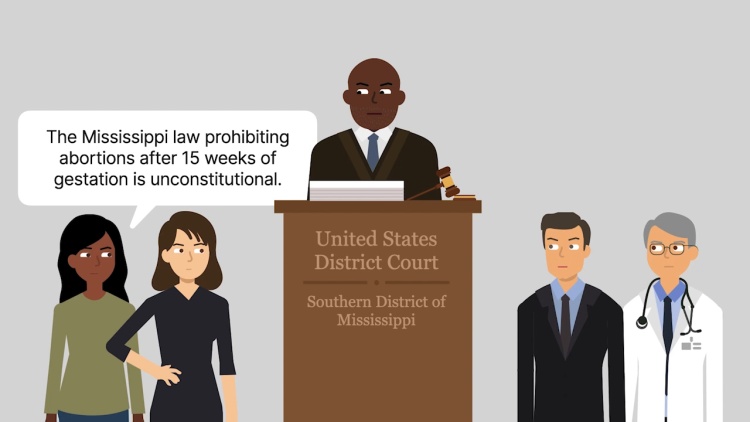Dobbs v. Jackson Women’s Health Organization
United States Supreme Court
597 U.S. 215 (2022)
- Written by Abby Roughton, JD
Facts
In 1973, Roe v. Wade guaranteed the constitutional right to obtain an abortion until the point of fetal viability. In 1992, Planned Parenthood of Southeastern Pennsylvania v. Casey held that states could not impose an undue burden on the right to obtain an abortion. In 2018, Mississippi enacted the Gestational Age Act, which generally prohibited abortion of fetuses with a gestational age of more than 15 weeks. In enacting the statute, the Mississippi legislature asserted a state interest in protecting unborn life. Mississippi abortion clinic Jackson Women’s Health Organization and one of its doctors (collectively, Jackson) (plaintiffs) brought an action in federal district court against state health officer Thomas Dobbs (defendant), arguing that the statute unconstitutionally limited the right to abortion. The district court granted summary judgment in Jackson’s favor and permanently enjoined the statute’s enforcement, holding that a state has a constitutionally adequate interest in banning nontherapeutic abortions only at the point of fetal viability, and 15 weeks was pre-viability. The United States Court of Appeals for the Fifth Circuit affirmed, and the United States Supreme Court granted certiorari. Mississippi and 25 other states asked the Court to overrule Roe and Casey and return regulation of abortion to the individual states. Jackson and the United States solicitor general asked the Court to reaffirm Roe and Casey and find the Mississippi statute unconstitutional.
Rule of Law
Issue
Holding and Reasoning (Alito, J.)
Concurrence (Kavanaugh, J.)
Concurrence (Thomas, J.)
Concurrence (Roberts, C.J.)
Dissent (Breyer, J.)
What to do next…
Here's why 908,000 law students have relied on our case briefs:
- Written by law professors and practitioners, not other law students. 47,100 briefs, keyed to 997 casebooks. Top-notch customer support.
- The right amount of information, includes the facts, issues, rule of law, holding and reasoning, and any concurrences and dissents.
- Access in your classes, works on your mobile and tablet. Massive library of related video lessons and high quality multiple-choice questions.
- Easy to use, uniform format for every case brief. Written in plain English, not in legalese. Our briefs summarize and simplify; they don’t just repeat the court’s language.






